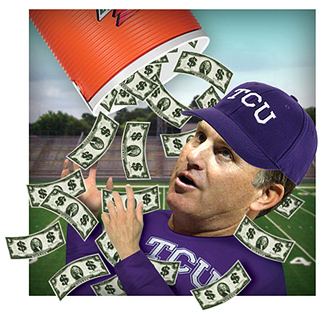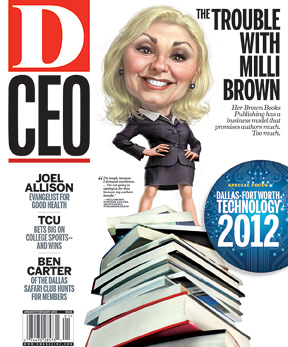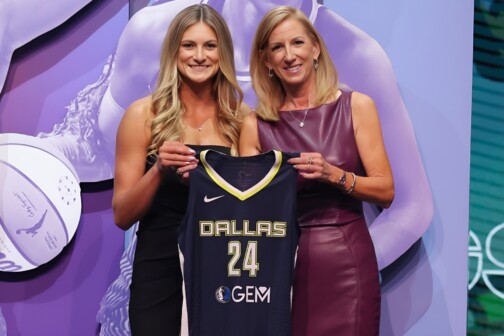By the numbers, college sports looks like a sucker’s game.
The vast majority of big-time programs lose money on athletics, even with sold-out stadiums, good TV ratings, and donations from high-rollers. Ninety-eight of 120 schools in the NCAA Football Bowl Subdivision reported a median deficit of $11.6 million in 2009-2010, the NCAA says.
The range of results was wider than the wide world of sports: One college had a $42 million surplus, while another had a $37 million hole.
With most programs operating in the red, colleges fill the gap with institutional money and student fees. On average, they cover 26 percent of athletic department budgets. Given the meteoric rise in tuition and student loans, reformers naturally want schools to spend less, insisting that students and alumni would enjoy the games just as much.
They have a point, but it’s never going to happen, not when upstarts are stretching to bust into the big leagues. Texas Christian University, a private school in Fort Worth with about 8,800 undergrads, just managed to make the giant leap. In the process, it shredded any argument for small ball.
TCU invested more than $160 million into its football stadium, upgraded other facilities, and ponied up a reported $3 million annually to keep its top-notch football coach. In five years, TCU more than doubled its athletics budget, from $21 million per annum to $52 million. And contrary to conventional wisdom, that turned out to be money well spent.
The Horned Frogs had a couple of wondrous football seasons, capped by a Rose Bowl win in early 2011. Then in October, TCU cashed in by joining the Big 12, a power conference with giant schools in Texas, Oklahoma, and Kansas.
The conference switch has many advantages for students and fans, including closer road trips, national media exposure, and the renewal of old rivalries. But nothing’s more tangible than the bottom line, and TCU’s annual revenue will never be the same.
TCU will eventually bank $17 million a year from Big 12 TV contracts, up from less than $2 million as a member of the Mountain West Conference, according to published estimates. That gives TCU a chance to actually run a surplus on sports, even as it beefs up the program.
The lesson? In a winner-take-all society, the only way to win big is to bet big.
TCU’s success provides cover for some college administrators, even while it makes others weak in the knees. Every year, Cinderella sports teams vault onto the national stage. But the impact is usually fleeting, especially on the academic side of the house.
In 1984, quarterback Doug Flutie led Boston College to a wild comeback victory on national TV. The game created huge interest in the school, and people hailed the “Flutie effect” as a justification for more sports spending.
Scholars later concluded that it was a myth. Any link between success on the field and more student applications with higher SAT scores “is small and not significantly different from zero,” researcher Robert Frank wrote. He also didn’t find a meaningful increase in donations from alumni.
Ironically, most university presidents don’t buy it. In a 2009 survey by the Knight Commission on Intercollegiate Athletics, more than two-thirds of presidents said that sports success attracted more and higher-quality applicants, and generated more gifts beyond athletics.
Those attitudes, the report said, “were at odds with nearly all of the most respected scholarship on these topics.”
TCU Chancellor Victor Boschini says that he absolutely believes that sports paid off big. They created enthusiasm and pride, and elevated the campus experience—intangibles that were his primary goals. As for metrics, he says the number of applicants to TCU increased from almost 8,700 to 19,000 in the past five years, with higher SAT scores. And how about this: Cash gifts and pledges from donors grew from nearly $53 million per year to $125 million, he says.
All that could fade with a few losing seasons. What’s here to stay—and what makes TCU such an outlier—is the additional conference revenue. As long as the Big 12 sticks together—and that’s largely up to the flagship universities of Texas and Oklahoma—the payoff will be there.
The TV contract alone is a home run. Bigger gate receipts will also come from bigger crowds in Fort Worth, Austin, Norman, and Lubbock. The exposure from nationally televised games allows for more brand building and merchandise sales, too.
More revenue from sports means that TCU won’t have to supplement so much of the cost. As a private school, it doesn’t disclose its institutional contribution. But the Knight Commission recently reported that spending on athletics grew twice as fast as spending on academics, with schools picking up a growing share. And the smaller the league, the bigger the tab.
In the Mountain West, where TCU currently competes, the median school contribution was nearly $30,000 per athlete in 2008. In the Big 12, the median supplement was $6,700, the commission says.
When TCU started investing heavily in sports, it never envisioned such a lucrative outcome. That happened only because the Big 12 began to break apart, which created an opening. TCU deserves credit for being ready to pounce.
Southern Methodist University lobbied to get into the Big 12 last fall, but its football program hasn’t performed like TCU’s. In 2004, both were in about the same place. SMU actually spent $1.5 million more on athletics than its Fort Worth rival, according to filings with the U.S. Department of Education.
Five years later, SMU had increased its budget by 59 percent, yet TCU was leaving it in the dust. In 2009, TCU outspent SMU by more than $16 million.
Everybody knows that money alone can’t buy a winner. But it buys a fighter’s chance.
Mitchell Schnurman is an award-winning business columnist for the Fort Worth Star-Telegram.





